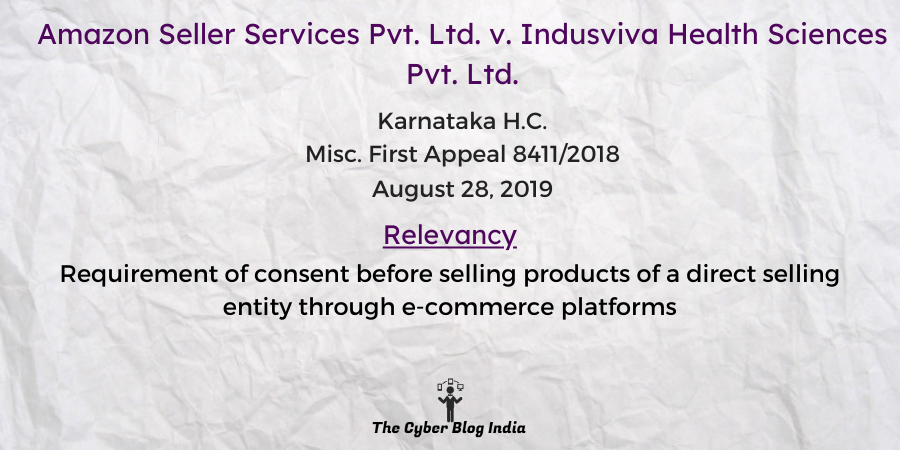[ad_1]
Amazon Seller Companies Pvt. Ltd. v. Indusviva Health Sciences Pvt. Ltd.
AIR 2020 Kar 5 : (2019) 4 AIR Kant R 766 : (2020) 1 ICC 725
In the Higher Court of Karnataka
Misc. First Enchantment 8411/2018
Before Justice Sreenivas Harish Kumar
Decided on August 28, 2019
Relevancy of the Case: Requirement of consent ahead of promoting solutions of a direct advertising entity as a result of e-commerce platforms
Statutes and Provisions Included
- The Data Engineering Act, 2000 (Part 79)
- The Code of Civil Treatment, 1908 (Get XXXIX Policies 1, 2)
- The Facts Engineering (Intermediaries Rules) Guidelines, 2011 (Rule 3)
- The Immediate Marketing Recommendations, 2016 (Clause 7(6))
Suitable Information of the Circumstance
- In a past get, the demo court docket handed an buy of momentary injunction versus the defendant/appellant to cease the sale of the plaintiff/respondent’s solutions on its platform.
- The appellant was endorsing the respondent’s products and solutions without the respondent’s consent. The respondent company is a immediate promoting entity for these products.
- The respondent sent a variety of communications by way of e-mail and lodged complaints to quit the sale of its solutions. Nevertheless, the appellant did not comply with these requests. After that, the respondent sent a legal detect to prevent the sale of its items.
- Even soon after receiving the legal detect, the appellant took no action.
Notable Arguments by the Advocates
- The appellant’s counsel argued that knowledge of an illegal or infringing incident can only be brought by a courtroom order, and only in that circumstance is the appellant obliged to act. As a result, the appellant was not obligated to act on the respondent’s ask for. The counsel also argued that rules referred by the trial court have no legal obligation for them to be followed. It claimed security beneath the secure harbour clause.
- The respondent’s counsel submitted that the appellant did not get consent from the respondent right before hosting the items on its platform. It also submitted that the communication despatched to the appellant did not avoid it from disclosing the seller of the solution. Also, the counsel pleaded that the trial courtroom exercised its jurisdiction effectively. Therefore, the court docket should really dismiss the appeal.
Impression of the Bench
- Knowledge of only unlawful incidents should really be brought via a courtroom buy. It does not involve violation of commercial legal rights or infringing incidents.
- Thanks diligence is necessary to claim protection below safe and sound harbour. If the host has precise expertise that the hosted material is infringing or illegal, it are unable to declare protection underneath the protected harbour.
- When faced with many attainable interpretations, the trial court’s assortment of a unique viewpoint does not undermine the validity of its decision. This comes underneath the use of the demo court’s discretionary powers.
Final Choice
- The court docket dismissed the appeal.
Ritesh Karale, an undergraduate college student at Maharashtra Countrywide Legislation College, Mumbai, ready this circumstance summary through his internship with The Cyber Blog India in January/February 2024.
[ad_2]
Source url






